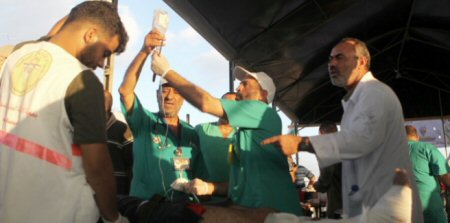With support from the European Union, the World Health Organization (WHO) is replenishing stocks of urgently-needed trauma medicines in Gaza, and providing hands-on training for health staff working in frontline Trauma Stabilization Points (TSPs).
Life-saving medicines and medical supplies to treat more than 100,000 people have been delivered to hospitals and TSPs, filling critical gaps as supplies rapidly deplete as a result of increasing numbers of casualties injured in ongoing demonstrations within the context of the Great March of Return that started on 30 March, 2018. In coordination with the Ministry of Health and the Palestinian Red Crescent Society, WHO supported the capacity building of more than 60 health workers in 10 TSPs on emergency management of casualties at the TSPs and Emergency Rooms.
“The role of health workers at Trauma Stabilization Points is crucial,” said Dr. Gerald Rockenschaub, WHO’s Head of Office for Gaza and the West Bank, according to the PNN. “Health staff in TSPs are usually the first to see wounded patients, and their capacity to resuscitate, stabilize, and treat patients with serious injuries can significantly increase patients’ chances of survival before they are referred to hospital for further medical care.”
From 30 March to the beginning of September 2018, more than 18,000 people have been injured during the ongoing demonstrations in Gaza. Of these, more than 8,600 people were managed and directly discharged at TSPs, and almost 9,500 referred by TSP health workers to hospitals for specialised care.
“When I was shot in the leg, I was taken to the closest trauma stabilization centre which was less than five minutes away. Doctors treated my injury and made sure I was stable enough to be taken to hospital. Without this immediate medical care to save my leg, I would have survived the journey to hospital, but my leg could have been permanently damaged,” said Waleed, one of the thousands of Palestinians treated at the TSPs.
“A chain is only as strong as its weakest link,” says Michelle Čičić, who oversees the EU’s humanitarian operations in Palestine. “It is critical that we are able to provide patients with life-saving care from the point of injury to the moment they are released from hospital. This serves to improve the health system in Gaza as a whole.”
To ensure a comprehensive and coordinated approach to the provision of trauma care in Gaza, WHO has established a dedicated Trauma Working Group with active participation from key partners delivering trauma care across the pathway. Different trauma sub-groups, focusing on areas such as reconstructive surgery and rehabilitation, bring together expertise and knowledge that will ensure quality emergency and trauma care for all injured.

